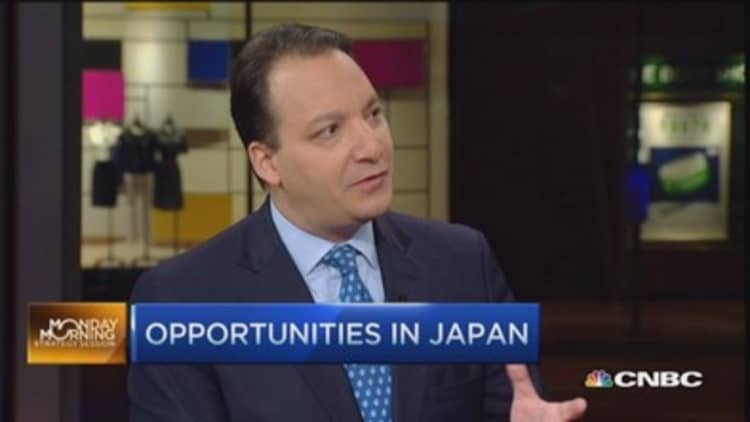Purchases of foreign stocks and bonds by Japan's giant pension funds and other big investors in 2015 could be their highest for at least a decade, if they keep pace with the $42 billion splurged during the first two months.
At that rate their annual net sales of yen would be over 30 trillion, the most since the government started keeping records a decade ago, and almost as much as the previous five years combined.
That will add to pressure on the yen, which earlier this month struck 122 per dollar - its lowest level since July 2007.
The outflows would wash away support that the yen could expect from a trade balance which, helped by cheap world oil prices and some improvement in Japan's exports, could return to surplus after a record $106 billion deficit last year.

Japan's giant pension funds have led the chase for overseas investments, diversifying their portfolios to find better returns than the paltry yields offered by Japanese government bonds.
The prospect of U.S. interest rates rising later this year, while the Bank of Japan remains deeply committed to quantitative easing, will help sustain demand for overseas investments even as pension funds begin to reach their asset allocation limits.
"Even if foreign asset buying by public pension funds run their course, it won't lead to immediate yen strength. Foreign investment will be sought as long as U.S. rates are rising," said Yunosuke Ikeda, chief forex strategist at Nomura Securities in Tokyo. "The private sector may fill the gap left by the public funds in 2016."
Read MoreJapan recovery to extend well into 2016
The shift toward overseas investments is a consequence of the reflationary polices adopted by Prime Minister Shinzo Abe more than three years ago.
The Bank of Japan's money printing, bond-buying strategy - aimed at lifting the economy out of decade-and-a-half of deflation - has reduced JGB yields to record lows, with yields for some tenors sinking into negative territory.
While the yen has suffered a 37 percent depreciation from its record high of 75 per dollar posted in October 2011.
Following the leader
Faced with that sea-change, Japan's Government Pension Investment Fund (GPIF), the world's largest pension fund with a portfolio worth 130 trillion yen ($1.08 trillion), has been at the forefront of shift away from domestic investments.
GPIF announced in October that it would increase foreign bond holdings from 11 percent to 15 percent and increase foreign stock investment from 12 percent to 25 percent, while slashing Japanese government bond holdings from 60 percent to 35 percent.
Three other semi-public pension funds, whose combined investment total some 30 trillion yen, have been following the GPIF's moves.
"The yen is likely to remain weak as flows from the 'three pension funds' will keep up the pressure once buying from GPIF begins petering out," said Daisaku Ueno, chief currency strategist at Mitsubishi UFJ Securities in Tokyo.
"Foreign asset buying from private sector investors will further shore up such flows if they kick in."
The president of state-owned Japan Post said last month that its banking unit would soon review its bond-centric 205 trillion yen ($1.7 trillion) portfolio, pointing to a major change in investment strategy.
Nomura's Ikeda reckoned the four pension funds alone have spent about a trillion yen a month on foreign stocks and bonds during the past eight months and reckoned they could invest another 12 trillion yen over the next year.
Osamu Takashima, head of FX strategy at Citigroup Securities in Tokyo, said GPIF, which is willing to invest more in risky assets, could buy an extra 8 trillion yen of foreign equities and another 2 trillion yen of foreign bonds.
Wall Street will benefit if GPIF stays true to character.
"The U.S. market accounts for bulk of the (GPIF's) equity investment benchmark, and the euro zone for only a small part," Takashima said.

